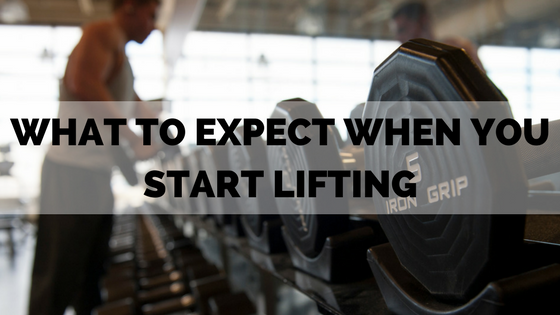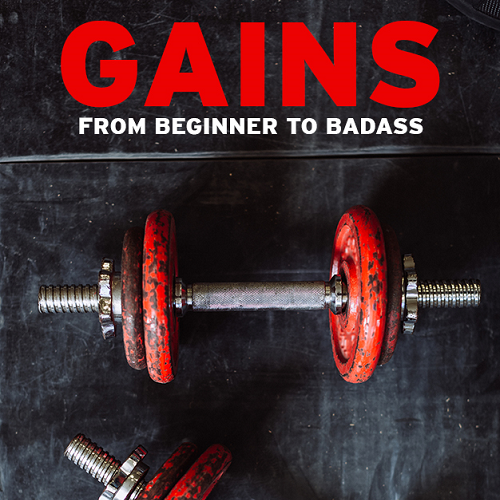What To Expect When You Start Lifting
Takeaway Points:
It’s important for beginners to establish good training patterns early, because this sets you up for future success.
In order to do so, it’s important to have realistic goals and expectations, or else you’ll quickly grow frustrated.
Unfortunately, few really understand the actual progress most people can expect, and bad trainers/coaches are always selling get-jacked-quick schemes.
Nobody’s fitness journey is perfect, so you should expect some delays and deviations from the normal guidelines.
One of the biggest problems facing the new exerciser is a complete lack of knowledge about what to expect. While many people have done some kind of physical activity before in their lifetime, and know enough to expect soreness, this is about the extent of their expectations.
It’s been found that people who have succeeded in their fitness goals in the past are much more likely to succeed in their goals in the future. This might initially sound like a given: of course these people will be more likely to succeed, because they have good experience. They know what to expect.
It’s important to consider the opposite: that people who haven’t succeeded in the past are less likely to succeed in the future, more likely to give up, less likely to have realistic expectations.
This is a phenomenon that Dick Talens refers to as the “feedback loop”: the fact that good experiences lead to more good experiences, and bad ones lead to more bad ones. In short, good events amplify and become self-sustaining over time, while bad events have the opposite effect.
The most common kind of feedback most people experience is what happens when you put a microphone (input) too close to the speaker it’s connected to (output). As a result, any sound you make into the microphone comes out of the speaker, louder - and then this louder sound passes to the microphone, and from the speaker again, even louder - and so on, until quickly the sound builds to high, screeching levels, and you quickly separate the two before you get a headache. This feedback loop applies to sound, but the same happens with our positive or negative experiences around exercise.
One of the most important things that a trainer or coach can do for a client is help the client to better understand and adhere to the process: giving them an accurate idea of their expectations, set realistic goals, and help guide them through any negative experiences. This support is often crucial to ensure that those important initial experiences are a step in the direction of a positive feedback loop.
Here’s a rough outline of what you can expect. For some realistic and evidence-based statistics on how much muscle you can grow, how much strength you can build, and how much weight you can lose, I recommend Greg Nuckols’ post on the subject of realistic training goals.
Initial Phase: ~1 month of consistent training.
Challenges/Traits: You don't know proper form for exercises. You cannot lift very heavy, and may find that some exercises are particularly unstable: muscular coordination is poor due to lack of training. Muscular damage and thus soreness during this phase is high, and this will inhibit growth and adaptation to the extent that you won’t see much muscular growth at all. At the same time, you may see huge jumps in initial strength as you grow more coordinated and used to the movements. Since this is all very new, you’re likely to experience some degree of anxiety or stress around the process of learning this new skill.
Remember: You need to establish good habits early in the process. You need to minimize difficulty during this phase, since you get very little muscular growth out of this part of the process anyway. You need to establish good form to avoid injury. You will need to get used to the fact that real progress will take time. A good trainer or coach can save you a lot of effort at this stage.
Noob Gains: ~1-3 months of consistent training.
Challenges/Traits: Motivation tends to falter here. Many people see minimal results in the first month, lose interest around this time, and quit. But at the same time, this phase is when you see your best results: you will see rapid growth of muscle and strength, provided you have a good program. If you’re consistently training the same movements, soreness will significantly decrease, your recovery will improve, and you’ll find that it’s easier to consistently exercise. Conversely, many people don’t have a good program, so they still don’t see the results that they’re looking for. However, if you can stick this out, it gets much easier soon.
Remember: You need a good program to progress, and you need social support to help overcome your frustrations with the process. By doubling down on your initial motivation and hiring a coach or using other motivational strategies, you can ensure that you make it past this “dark” phase.
Intermediate Results: ~3-12 months of consistent training.
Challenges/Traits: Your results start to slow down considerably. Where you might have been able to put 10-30lbs per month onto your major lifts in the first few months, you find that it’s more like 5-10lbs per month now. The principle of diminishing returns kicks in - you have to spend more and more time in the gym to see smaller and smaller improvements. At the same time, you’re now more used to the process: you don’t get very sore anymore, and you now are used to the gym enough that you’re less intimidated by everyone else.
Remember: You need to establish a proper habit, and workout consistently, even if this means dropping a workout or going off plan here and there. What matters more is long term thinking and consistency than short term effort. You need to accept that fast growth is behind you, and that barring any sudden changes in your program (which shouldn’t happen too much if you have a good one) or diet, you won’t see any sudden jumps in your results. Slow and steady. You also need to remain humble: you may feel high and mighty for having stuck it out this far, but there’s a long way to go.
Advanced Results: ~1-2 years of consistent training.
Challenges/Traits: At this point, results slow to a crawl. Even with consistent training, you may not see consistent growth in muscle or strength from month to month. Sometimes, it may take several months to see any progress. At the same time, you’re used to it. You know the process and you know what to expect. So long as you stick with it, you’re still improving.
Remember: This is another point where many get bored, because they’ve seen a large chunk of their overall results. At this point, many decide to scale back their effort, focus on maintenance, and avoid pushing themselves too hard. Others decide to get more serious, choosing to compete as bodybuilders or powerlifters, setting more ambitious goals, and so on.
Reaching Your Limits: ~2-5+ years of consistent training.
Challenges/Traits: Most people hit most of their results with around 5 years of good training. While you can continue to improve after this point, results are so slow that it may take 3-6 months of hard training to see any consistent improvement. Training also gets harder, and you need to push the limits of your recovery. This also means more complex, careful, and customized training, as well as more careful adherence to diet.
Remember: At this point, it may be smart to shift to maintenance or really ask what your plans are, long term. If you’re not looking to compete, it may be smart to take up minimalist programs that will be effective at maintaining your hard work without too much additional time spent in the gym. At the same time: you're a badass. You've been through the process. If you've been studying, you know a lot of what there is to know.
But these results aren't always typical.
I’d like to point out is that this is a best case scenario analysis. This scenario assumes that everything goes well, you take no serious or unexpected injuries or breaks from your training, and you have a good training and diet program. If you don’t, your results may be slower or less consistent than laid out here, or you may plateau in your training. Since every person is different and some people will adapt faster or slower to exercise, some may see results faster or slower than this even if they do have a good program.
Realistically, your own results will likely be more to the maximum end of the estimations than the minimum end, especially if you’re going it alone. For example, I was effectively stuck in the noob gains/intermediate results phase for about five or six years when I first started training, due to bad training and poor diet. It was only when I got serious with my training around the sixth year that I took up a more intelligently structured diet and exercise program, and started to see consistent results again.
If you suddenly get more serious about your exercise or diet, take up a smarter exercise program, or get some chemical assistance, you may see a “noob gains”-like sudden jump in your results. This is simply because when you add something new into the mix, your body goes through a new process of getting used to it. This is very similar to the way the initial stimulus of exercise works in the first place! Once this new level becomes normal, your results slow down to post-noob-gains levels just the same as they do after you get used to exercise in the first place.
So, let’s say that you train as a runner for several years, go through this process, and then decide to switch over to training like a bodybuilder. Even though you’ve already been through the noob gains/diminishing returns process for running, you haven’t for lifting: so you’ll go through it all the same as if you were a noob, even though you’re not entirely new to exercise. This can happen with any significant change in your training goals and methods.
Another consideration is time off. If you take a significant amount of time off, you’ll start to lose your hard work. At the same time, if you come back, you’ll see faster progress than before: you’ll experience the same cycle of newb gains/soreness/getting used to exercise, but in an abbreviated form. So, taking a significant amount of time off will essentially reset this cycle, but your body will go through the process more quickly a second time.
Enjoy this post? Share it on Facebook or Twitter.
Further Reading:
Are you interested in perfecting your deadlift and building legendary strength and muscle? Check out my free ebook, Deadlift Every Day. Or maybe a well-rounded beginners program for those looking to build strength, muscle, and endurance? Check out my other free ebook, GAINS.
Interested in coaching? Inquire here.



